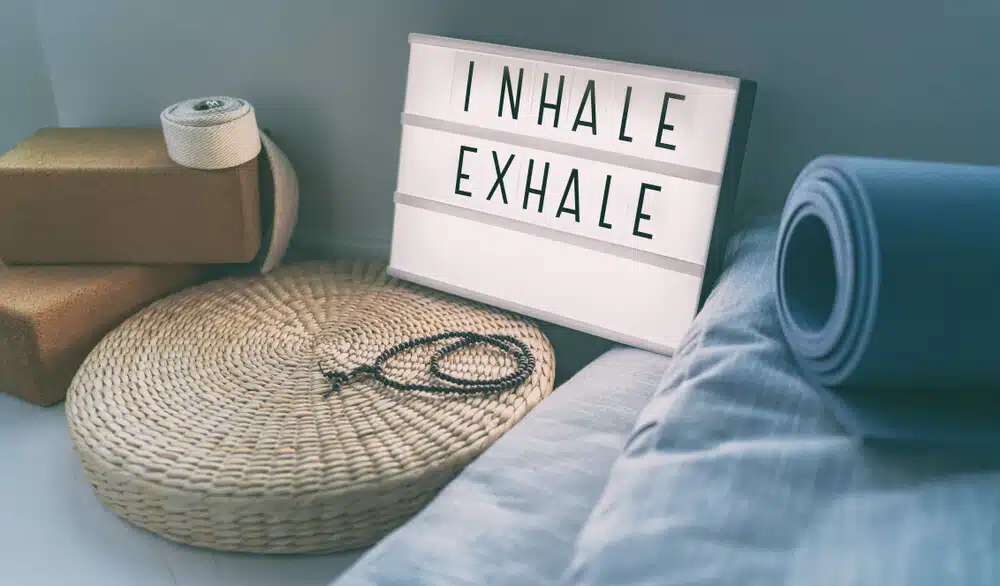
How to Reduce Anxiety
“Life is 10 percent what you experience and 90 percent how you respond to it.” ~ Dorothy M. Neddermeyer, Ph. D. – Internationally recognized therapist
For teens suffering from anxiety, this 90% can be overwhelming, all-consuming, and life-changing. According to the Anxiety and Depression Association (ADAA), anxiety disorders are present in over 25% of teens between the ages of 13 and 18. For 25% of the young people in this country, their response to life and its experiences consumes their day and every waking thought. Unfortunately, those thoughts when they are not awake too!
Think about the life of a teenager. They are still technically children yet many of them experience more pressure and stress than an adult. They are dealing with the many changes that their bodies and minds are experiencing, navigating the tumultuous, dramatic life of a “normal” teenager, and are faced with the pressures of school, home, sports, and their future.
Teens are being asked to think about their future at a younger age, some even beginning in elementary school. Counselors are asking them to ponder their future, to dream about where they see themselves, to envision what their life will be like. This can place a tremendous amount of pressure on any child let alone one who may already be prone to worry and be anxious about life in itself.
Anxiety in teens can manifest in any number of ways and is not necessarily consistent among teens. What causes extreme worry for one may not result in any anxiety for another. It is not necessarily the worry that can be considered anxiety but rather the obsession over life, experiences, and decisions that can be characterized as anxiety. There are several indicators of whether your teen may be experiencing anxiety.
Symptoms of anxiety in teens
- Unrealistic worry over everyday things
- Replaying situations, conversations, or scenarios over and over in their mind
- Lack of concentration
- Inability to let go of worrisome thoughts
- Inability to make decisions
- Harping on things that may seem inconsequential
- Restlessness
- Difficulty dealing with normal occurrences even including school, their health, social interactions
- Sleep issues either insomnia or sleeping too much
If you suspect that your teen may be suffering from anxiety, you must reach out to their pediatrician for an evaluation and discussion about treatment options. If left untreated, anxiety can have serious negative effects on a teen’s life including the inability to go to school, to experience normal social relationships, risks to health, and even other mental health disorders such as depression, substance abuse, and eating disorders. The trained mental health professionals at Beachside Treatment Center can help your teen to manage their obsession to worry and to develop appropriate coping mechanisms to get them through their day. As important as diagnosis and treatment by a mental health professional is, there are also some things that you can do to help reduce anxiety for your teen.
Tips to Reduce Anxiety
Anxiety is not something that defines a person. It is a feeling, an intense one, but a feeling nonetheless. Negative thoughts create feelings of what-if that grow bigger and bigger until they are overwhelming and out of control.
That being said, it seems only natural that if you can control the thoughts, you should be able to control the feelings before they get out of control. To understand this, take a look at why worry happens. We all have the innate characteristic in our bodies for fight or flight. It is the body’s way of protecting it from harmful situations. In teens who experience anxiety, the fight or flight response is activated very easily and quickly and is not turned off very easily.
Fight or flight may kick in when a teen thinks about going to a party. They envision every detail about the event from what they will wear to walking in and even approaching other teens. The more that they think about it, the more those thoughts turn into feelings and they begin to become nervous, scared, and yes, anxious. To reduce these feelings that are stirred up, they first have to get control of the thoughts. Of course, that is easier said than done but with the help of several tips and tricks, teens can reduce the level of stress that their thoughts place on their bodies.
- Mindfulness. The practice of mindfulness helps a teen to remain in the present, focusing on things that they can control now rather than casting their thoughts on the future and all of its possibilities. It helps to squash the “what-ifs” and to hamper the negative feelings that cause anxiety.
- Exercise. Any activity that gets the heart rate up is considered exercise. For some teens, they may be exhilarated by running or high-intensity workouts and reap the many benefits. While others may be comfortable taking a stroll with their friends or walking the dog. Exercise brings oxygen to the brain where it can help to bring clarity, focus, and concentration. Although a teen who is experiencing anxiety may be anxious about leaving the house, there are many activities that they can do right at home including yoga, weight lifting, or use an exercise video.
- Go out and do it. Although it may be extremely difficult, doing that thing that is causing the anxiety may help to reduce some of the anxiety. Demonstrate to your teen that life does not have to be scary and that it can be beautiful and enjoyable. If they can go out and do one thing that makes them anxious, they will understand that it is not the huge elephant in the room as they thought.
- Breathing. Although breathing is obviously natural and we do it thousands of times per day, taking deep, strong breaths initiate a relaxation response. It helps to neutralize the sudden onset of the fight or flight mode and helps to bring in a rush of good feelings instead with each breath.
- Diet. What you eat can have a direct impact on how you feel. If your teen exists on a diet of chips, soda, and candy, they are not receiving the proper nutrition to support a healthy lifestyle and most importantly, a healthy brain. When the brain is off-kilter, it has a greater tendency to wander down the path of those negative thoughts and therefore, allow obsessive feelings and emotions to take hold. Be sure that your teen is consuming a well-rounded diet of nutritious food and drinks plenty of water.
- Sleep. Sleep is critical to brain health. Although some teens with anxiety may experience difficulty sleeping because they cannot turn their brains off so to speak, they must do their best to get the brain-rejuvenating sleep that they need.
- Connections. Although it may be uncomfortable and anxiety-inducing to go out in public or to hang with friends, spending time with friends does wonders to help to reduce anxiety. When teens connect with others who love them, they feel supported, secure, and loved. These feelings go a long way in suppressing the negative thoughts that tend to jumpstart oppress feelings of anxiety. Teens will be reminded that they are not alone and that everyone has negative thoughts, doubts, concerns, and worries.
- Gratitude. When the world seems to be closing in, teens can help to reduce their anxiety by appreciating the little things. Focus on all of the things that are going well, are good, beautiful, and positive. Imagine all that could be rather than the negative things that fill the vulnerable mind.
- Become one with nature. While it is often said that too much sun can be harmful to your skin, there is certainly additional proof that there are also positive effects from sunlight. The serotonin that the body absorbs from the sun’s rays does more than boost your mood. It also helps to improve sleep, reduce inflammation, and increase vitamin D which is essential for overall health. Encourage your teen to get outside and become one with nature and enjoy the many benefits that nature has to offer including sunshine, exercise, and to appreciate the beauty all around them.
- Can’t say it? Write it! For some teens, it is difficult to express in words what they are thinking or feeling. They may be more comfortable and capable of writing how their thoughts make them feel or the fears that they have. Journaling is an effective way of reducing anxiety as it allows a teen to prioritize their problems, to identify those things that should be concerning while understanding the hold that they have allowed thoughts and feelings to have over them. When teens write out their deepest, darkest worries, they may come to understand that logically they have nothing to be afraid of.
Anxiety is a serious mental health disorder that if left untreated can have serious repercussions.

Through the process of reducing anxiety at home and the guidance and support of trained mental health professionals like those at Beachside Treatment Center, your teen will learn the appropriate way to manage and cope with their triggers that can kick off those thoughts and feelings. They will learn to release those pent-up feelings in such a way as to put them into a more positive frame of mind and improve their sense of well-being. Teens can recover from their diagnosis of anxiety and lead successful, fulfilling, and satisfying lives free of the worry that may have been holding them back from all that they wanted.




